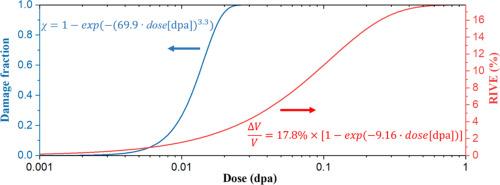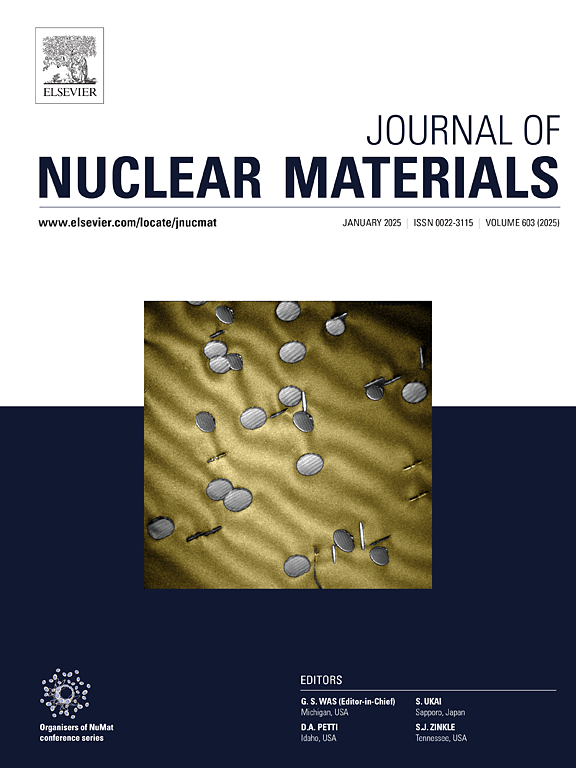Investigation of ion irradiation effects on mineral analogues of concrete aggregates
IF 2.8
2区 工程技术
Q3 MATERIALS SCIENCE, MULTIDISCIPLINARY
引用次数: 0
Abstract
Irradiation can cause prominent damage to reactor concrete aggregates leading to amorphization, strength and modulus decrease, radiation induced volume expansion (RIVE) and micro-cracking, which limits their long-term performance. To develop an improved understanding of irradiation effects in concrete, three mineral analogues of concrete aggregates (limestone, marble and quartzite) were irradiated by 5.5 MeV He ions and 13 MeV Ni ions to surface doses of 0.011 displacements per atom (dpa) and 0.23 dpa, respectively, at room temperature. The two different ion species allow irradiation spectrum effects (ionizing and displacive) to be examined. Irradiation induced cracks were observed in He irradiated limestone and marble, and Ni irradiated quartzite. Full amorphization was observed in Ni irradiated quartzite with 14.3 % RIVE, and ∼25 % hardness and modulus decrease, while almost no change was observed in He irradiated quartzite except 4.35 % RIVE, revealing a possible ionization enhanced diffusion effect for high energy light ions. Furthermore, partial amorphization was observed in Ni irradiated marble and limestone matrix with a 12 % hardness decrease in marble while no amorphization was observed for He irradiation with a 20 % hardness increase in limestone matrix. The role of knock-on damage and irradiation spectrum on amorphization, volumetric expansion and mechanical property changes are discussed. Moreover, the onset and critical doses for amorphization and RIVE in quartz are obtained for ion irradiations at room temperature. The dose dependence of RIVE exhibits a delay compared to the amorphization behavior. The superior irradiation resistance of calcite phase compared to quartz phase implies there could be advantages to using calcareous aggregates and lowering the usage of siliceous aggregates for concrete in nuclear power plants for extended operation beyond 60 years. However, other effects such as corrosion, aging and reactions during severe accidents should also be considered, and further investigations are needed.

离子辐照对混凝土骨料矿物类似物影响的研究
辐照会对反应堆混凝土骨料造成明显的损伤,导致非晶化、强度和模量降低、辐射诱发体积膨胀(RIVE)和微开裂,从而限制了反应堆混凝土的长期性能。为了更好地了解混凝土中的辐照效应,在室温下,用5.5 MeV He离子和13 MeV Ni离子分别将混凝土骨料的三种矿物类似物(石灰石、大理石和石英岩)照射至0.011 dpa和0.23 dpa的表面剂量。这两种不同的离子可以检验辐照光谱效应(电离和置换)。在He辐照的石灰岩、大理石和Ni辐照的石英岩中均观察到辐照诱发裂纹。14.3% RIVE的Ni辐照石英岩完全非晶化,硬度和模量下降~ 25%,而除了4.35% RIVE外,He辐照石英岩几乎没有变化,说明高能光离子可能存在电离增强扩散效应。此外,Ni辐照大理岩和石灰石基体中观察到部分非晶化,大理岩硬度降低12%,而He辐照后石灰石基体硬度升高20%,未观察到非晶化。讨论了撞击损伤和辐照谱对非晶化、体积膨胀和力学性能变化的影响。此外,还得到了室温下离子辐照石英的非晶化和RIVE的起始剂量和临界剂量。与非晶化行为相比,RIVE的剂量依赖性表现出延迟。方解石相的抗辐照性能优于石英相,这意味着在核电站运行60年以上的情况下,使用钙质骨料和减少硅质骨料在混凝土中的使用可能具有优势。但是,还应考虑腐蚀、老化和严重事故中的反应等其他影响,需要进一步研究。
本文章由计算机程序翻译,如有差异,请以英文原文为准。
求助全文
约1分钟内获得全文
求助全文
来源期刊

Journal of Nuclear Materials
工程技术-材料科学:综合
CiteScore
5.70
自引率
25.80%
发文量
601
审稿时长
63 days
期刊介绍:
The Journal of Nuclear Materials publishes high quality papers in materials research for nuclear applications, primarily fission reactors, fusion reactors, and similar environments including radiation areas of charged particle accelerators. Both original research and critical review papers covering experimental, theoretical, and computational aspects of either fundamental or applied nature are welcome.
The breadth of the field is such that a wide range of processes and properties in the field of materials science and engineering is of interest to the readership, spanning atom-scale processes, microstructures, thermodynamics, mechanical properties, physical properties, and corrosion, for example.
Topics covered by JNM
Fission reactor materials, including fuels, cladding, core structures, pressure vessels, coolant interactions with materials, moderator and control components, fission product behavior.
Materials aspects of the entire fuel cycle.
Materials aspects of the actinides and their compounds.
Performance of nuclear waste materials; materials aspects of the immobilization of wastes.
Fusion reactor materials, including first walls, blankets, insulators and magnets.
Neutron and charged particle radiation effects in materials, including defects, transmutations, microstructures, phase changes and macroscopic properties.
Interaction of plasmas, ion beams, electron beams and electromagnetic radiation with materials relevant to nuclear systems.
 求助内容:
求助内容: 应助结果提醒方式:
应助结果提醒方式:


